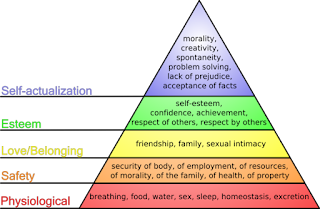A Comparative Study Between:-
Hindu Religion, Sex and Nepalese
Education
According to Maslow’s Hierarchy of
needs, food, cloth, shelter, water, Sex are the basic needs which a human wants
for survival. But while teaching or while learning the theory we have been
taught in hindu religion sex should be done after marriage. In western culture
it is different.
Even in one Television Interview
Swami Arun Anand Swami had said sex is the basic part of human life and no any
human can be born without it. Not only for human but for other leaving
creatures they need sex to continue generation. The only things is In Hindu
religion it should be done after marriage.
( By Swami Arun Anand , Osho)
Khaptad Swami Book ( Bichar Bigyan
, Nari Dharma and Purush Dharma) have mention that thought arises due to food
so to have pure thought people should have pure food, he should leave in good
environment, good friends should be there. He also have mention in his book
(Naridharma and Purush dharma) in Hindu religion the role of female is more
high or have to be pure in context of male.
But if we look no anything is going
good. Due to globalization western culture have been adopted in Nepal. Wine
have become common thing. Goods Friends is difficult to get.
Now lets come to the Nepalese
Education and how it is affecting to Hindu religion.
If we see the Nepalese Education
(12+2+4+2)= 20 yr + 2 yr (delay)= 22 yr + 5 (student start school)= 27 year One
student study upto 22 year of age if he have regular study.
The human development (voice,
sperms, other body parts) starts to develop from the age of
13-15.
Now the main important thing is
there is a big mental or physiological problem among the student during student
life regarding to sex. If we see Nepalese society one boys can have relation
with many girls but his back history is not seen but if one girls have relation
or have any kind of unclear back history everything is seen during marriage
period (time).
In one lesson of +2 (nepali) Basai Upanyas written by Lil Bahadur Cheetry has mention why the people migrate or leave
the society. One of the reason is the social issue. By three characters Rikuta , Jhuma and Motakaji he have presented his view.
Now today if we see many students
during their student time period have bf/gf , leaving relation, sexual affair
with one or more friends. It have become common things in student life that is
before marriage period. But when
one boy wants to marry a girl (generally in arrange marriage) there family want a wife like Laxmi who should be
have all 32 character which Hindu religion says.
I cant say it as negative since
Bhagwat Gita too have said (Change is the law of Universe) but the words of
Hindu Mahatmas says western culture should not be followed in Hindu religion.
In my view if we look towards Hindu
religion the 26-27 year education is one of the biggest problem for the
student. We have followed the International standard but we don’t have match
the standard with the religion. Since we can see the student mental body lacks
in the class, many kind of headache problem, other things appear in student
life.
If we look towards the Britain and
US culture, there is not any kind of words called Virginity or the history
donot matters during the marriage time,
there is no any problem of caste, and other things during the marriage.
Regarding to Nepal and India all
this things matter. But one very good point of India is History hides In India
due to its population and area. But in Nepal History cannot be hide.
In conclusion, I would like to say
the International Standard made by USA and Britain should not be matched with
Nepal or India since our religion says one thing while there religion says
other. So 25 year education is also one of the greatest threat to destroy our
Hindu Religion.( Destroy in the sense the castes is been ended, more in love
marriage is there without understanding anything, insult and frustration in
parents, people are liking western culture and many other thing).
By:-
Krishna Raj Bhatta
10 june 2015, 7:45 pm
Dhangadhi-02, Baiya Behadi.

A Very realistic and relevant article krishna Raj ji .Its good. Keep on writing .Your original thaughts as well as your experiences have given the article clear shape.I whole-heartedly appreciate your efforts .
ReplyDeleteSchool against Gurukul!!
ReplyDelete